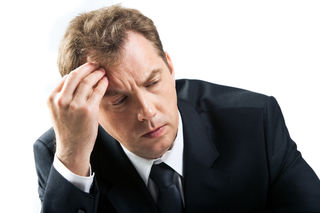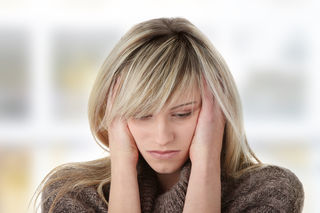Anxiety
Why Do Anxiety and High Blood Pressure Go Hand-In-Hand?
Fortunately, there are more than a dozen med-free options that can fix both.
Posted February 15, 2018 Reviewed by Devon Frye

As a psychologist who trains therapists around the country in new ways to combat anxiety, I have become interested in the relationship between anxiety and high blood pressure.
Which causes which? And can treatments for one help with the other? Here’s the latest that I've found in my search for answers.
Does anxiety cause high blood pressure?
The answer seems to be complex: No and yes.
Sheldon Sheps, M.D., writes for the Mayo Clinic that, “Anxiety doesn't cause long-term high blood pressure (hypertension). But episodes of anxiety can cause dramatic, temporary spikes in your blood pressure. If those temporary spikes occur frequently, such as every day, they can cause damage to your blood vessels, heart, and kidneys, as can chronic high blood pressure." So even though anxiety may not cause chronic high blood pressure, it can cause similar health problems.
Dr. Sheps adds a warning about a second way in which anxiety can damage cardiovascular health. Because of their sedating side-effects, physicians may prescribe anti-depressants to lower anxiety. Unfortunately, these drugs, known as serotonin and norepinephrine re-uptake inhibitors (SNRIs), can increase your blood pressure.
Yet another concern rises if you take into account a third variable—that ever-important phenomenon of sleep (or lack thereof). Dr. Sheps' article refers to Dr. Robert Rosenberg, Medical Director of The Sleep Disorders Centers of Prescott Valley and Flagstaff (in Northern Arizona) to explain that anxiety can cause you to lie awake worrying or to sleep fitfully. If so, your body’s stress reaction is being activated while you lie in bed—that is, during the very hours that your body is supposed to be recuperating from your daytime activities, feelings, and thoughts. Stress reactions throughout the night cause your body to release cortisol and adrenaline, two chemicals that raise blood pressure. Hypertension, here we come.
Ultimately, if you are experiencing too much anxiety, it's best to do something to reduce it—both for health reasons and because, frankly, anxiety feels unpleasant.

Does high blood pressure cause anxiety?
Probably not directly.
At the same time, the fear of what high blood pressure could be doing to your body definitely can cause anxiety.
High blood pressure does not create immediately visible or painful symptoms. That's why most people are unaware when their blood pressure has become too high, unless their medical professionals have discovered it in a health checkup.
The difficulty is that high blood pressure can lead to potentially fatal consequences. Want atherosclerosis (hardening of the arteries), a stroke, or a heart attack? If not, it's best to lower your blood pressure.
Can treatments for one hurt the other?
As I wrote above, one category of medications for anxiety (anti-depressant medications like SNRI’s) can increase blood pressure. At the same time, the benzodiazepines (Valium, etc.), which used to be the mainstay of anxiety medications, can be highly addictive. Struggling with addiction, if it arises, will likely create additional anxiety.
On the other hand, several medications used to treat blood pressure may include anxiety as a possible side effect. An online search may be helpful if you've been prescribed a specific medication and want more information on this concern.
Can treatments for one help the other?
Here, there is good news. Non-drug treatments for high blood pressure tend to be the same treatments that lower anxiety. The following list of treatments may both lower blood pressure and reduce anxiety:
- Yoga: There is now a significant amount of research on yoga as a possible treatment for anxiety. Research also indicates that yoga may help treat hypertension if it incorporates three particular elements: poses, meditation, and breath control.
- Exercise: Review articles summarizing the research on exercise's impacts on hypertension and on anxiety conclude that three factors are important for effective results: frequency (the best is daily), intensity (it's helpful, at least some of the time, to pump it up), and time (30-60 minutes).
- Sex
- Sunshine, outdoor scenes, and natural environments
- Acupuncture
- Massage
- Biofeedback
- Managing alcohol consumption
- Addressing negative worry habits: Use thought substitution—that is, replace worried thoughts with a visualization of a positive scene. The scene needn’t be a solution to your problem. Just visualize any situation in which you see yourself feeling relaxed—such as playing with children, floating in the water at the beach, lying in the sunshine, or sitting in a garden with colorful flowers in full bloom.
- Sleep: Beware, however, of taking pills for sleep. Many come with the risk of negative side effects.
- Meditate
- Use a float tank: Restful floating seems to reduce anxiety, at least temporarily, as well as lowers blood pressure. More studies are needed to establish whether ongoing use of flotation treatments removes these difficulties over the long-term.
- Problem-solve: The single best stress-reducer is to find solutions to the dilemmas you are facing. It's especially essential to learn to talk over disagreements, both at work and at home, in a collaborative and constructive way. Check out my Power of Two book and workbook for clarity about these skills.
The bottom line: Both high blood pressure and excessive anxiety can be alleviated. In some cases, this can be done without risking side effects from medications.
Medications can fix many problems. They save lives.
At the same time, when alternative treatments—many of which come with few (if any) negative side effects—are options, it seems to me that these are worth a try. If you can say goodbye to both high blood pressure and anxiety by availing yourself of one (or several) of the no-pill options in the list above, how would that change your quality of life?
You get only one life. Take care of yourself.




